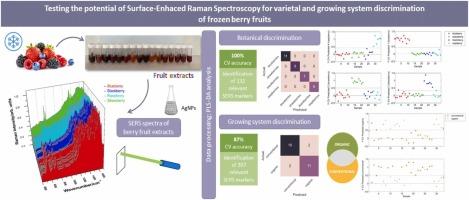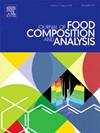测试表面增强拉曼光谱在冷冻浆果的品种和种植系统鉴别方面的潜力
IF 4
2区 农林科学
Q2 CHEMISTRY, APPLIED
引用次数: 0
摘要
我们开发了一种结合化学计量学和表面增强拉曼散射(SERS)的经济有效的新方法,用于区分罗马尼亚市场上的各种小浆果,并根据种植系统(即有机还是常规)对它们进行分类。利用 SERS 数据和偏最小二乘判别分析(PLS-DA),我们区分了四个植物组(草莓、覆盆子、黑莓、蓝莓),并确定了 132 个有效的光谱标记,交叉验证的准确率达到 100%。对 SERS 数据进行 PLS-DA 分析后,有机与传统耕作系统分类的准确率达到 87%,灵敏度、特异性和精确度均超过 84%。在 33 个样本中,该分类模型正确预测了 29 个样本的耕作制度,突出表明了所识别标记的相关性以及该方法在快速评估未知样本方面的有效性。本文章由计算机程序翻译,如有差异,请以英文原文为准。

Testing the potential of Surface-Enhanced Raman Spectroscopy for varietal and growing system discrimination of frozen berry fruits
A new, cost-effective method combining chemometrics with Surface-Enhanced Raman Scattering (SERS) was developed to differentiate various small berry fruits from Romanian markets and classify them according to the growing system (i.e. organic or conventional). Utilizing SERS data with Partial Least Squares-Discriminant Analysis (PLS-DA) we distinguished among four botanical groups (strawberry, raspberry, blackberry, blueberry) and identified 132 effective spectral markers, achieving 100 % accuracy in cross-validation. The PLS-DA analysis of SERS data yielded an 87 % accuracy score for classifying organic versus conventional farming systems, with sensitivity, specificity, and precision scores greater than 84 %. This classification model correctly predicted the farming system for 29 out of 33 samples, underscoring the relevance of the identified markers and the methodology’s efficacy for the rapid assessment of unknown samples.
求助全文
通过发布文献求助,成功后即可免费获取论文全文。
去求助
来源期刊

Journal of Food Composition and Analysis
工程技术-食品科技
CiteScore
6.20
自引率
11.60%
发文量
601
审稿时长
53 days
期刊介绍:
The Journal of Food Composition and Analysis publishes manuscripts on scientific aspects of data on the chemical composition of human foods, with particular emphasis on actual data on composition of foods; analytical methods; studies on the manipulation, storage, distribution and use of food composition data; and studies on the statistics, use and distribution of such data and data systems. The Journal''s basis is nutrient composition, with increasing emphasis on bioactive non-nutrient and anti-nutrient components. Papers must provide sufficient description of the food samples, analytical methods, quality control procedures and statistical treatments of the data to permit the end users of the food composition data to evaluate the appropriateness of such data in their projects.
The Journal does not publish papers on: microbiological compounds; sensory quality; aromatics/volatiles in food and wine; essential oils; organoleptic characteristics of food; physical properties; or clinical papers and pharmacology-related papers.
 求助内容:
求助内容: 应助结果提醒方式:
应助结果提醒方式:


